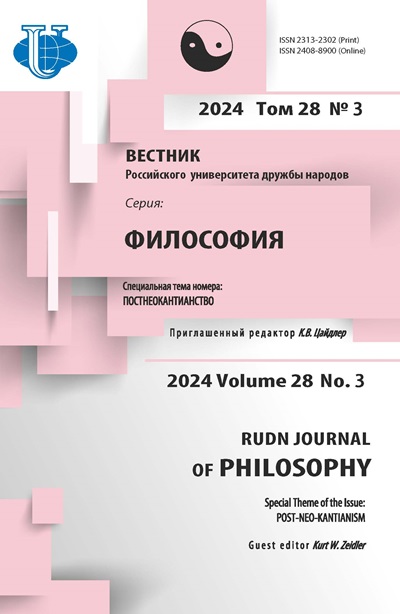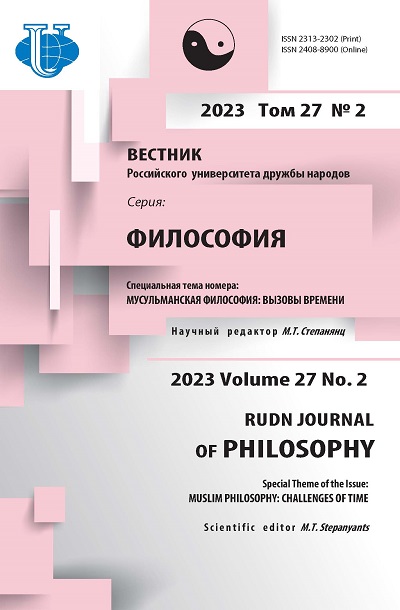Captiveness and Openness as Ontological Intuitions in Works of H. Bergson
- Authors: Litvinov M.F.1
-
Affiliations:
- Voronezh State University
- Issue: Vol 27, No 2 (2023): MUSLIM PHILOSOPHY: CHALLENGES OF TIME
- Pages: 332-344
- Section: PROBLEMS OF ONTOLOGY
- URL: https://journals.rudn.ru/philosophy/article/view/35001
- DOI: https://doi.org/10.22363/2313-2302-2023-27-2-332-344
- EDN: https://elibrary.ru/IQHFIU
Cite item
Full Text
Abstract
The research focuses on the problem of freedom from that point of view which puts captiveness by being and openness to being in the middle of non-dialectical examination. This perspective clarifies not only the major course of Bergson’s thought, but also the subsequent incorrect shift to the pole of openness in the hermeneutical interpretation of facticity, implemented by Heidegger. The work is conventionally divided into two parts. The first one inquires about specifics of the method used by Bergson. It is emphasized the proximity in between Bergson's orientation to the common sense and phenomenological research, despite all differences in these approaches. Also it’s gives a general analysis of Bergson’s concepts used in “Time and Free Will: An Essay on the Immediate Data of Consciousness” and in “Matter and Memory” in order to adequately questioning about the freedom of a person, acting on the basis of specific practical conditions of his existence. Bergson draws the roads of freedom through the adaptability of the intelligible to the prose of life, establishing the plane of immanence with its unbreakable boundaries. The second part analyzes aesthetic consequences of Bergson’s theory of perception and memory, thus opening access to descending pathways in sensory data processing. The theory of duration and the emphasis it places on retrospection in clarifying what accompanies the act of perception, argues for the connection of creativity with the process of actualization of the virtual. With reference to Deleuze, it is criticized the irrational attempt to assert the beginning of creativity both in nothingness and in the realization of the possible by its limiting. Thus, the appeal to Bergson’s ontological intuitions allows to refuse both the aesthetics of the origin and the logic of the readiness-to-hand-being as primarily encountered in the world. In conclusion, it is considered Bergson's polemic with Einstein, in the resolution of which the logic of differentiation seems preferable to the logic of dialectical sublation.
About the authors
Maksim F. Litvinov
Voronezh State University
Author for correspondence.
Email: litvinov@phipsy.vsu.ru
ORCID iD: 0000-0003-0161-9254
Candidate of Philosophy, Associate Professor, Department of History of Philosophy and Culture, Faculty of Philosophy and Psychology
1, University square, 394018, Voronezh, Russian FederationReferences
- Cherniavsky A. Exprimer l’esprit. Temps et langage chez Bergson. Paris: L’Harmattan; 2009.
- Bergson H. Time and Free Will: An Essay on the Immediate Data of Consciousness. In: Collected works in 4 volumes. Vol. 1. Moscow: Moskovskij club; 1992. P. 45—155. (In Russian).
- Husserl E. Ideas Pertaining to a Pure Phenomenology and to a Phenomenological Philosophy. First Book: General Introduction to a Pure Phenomenology. Moscow: Akademicheskij proekt; 2009. (In Russian).
- Bergson H. Matter and Memory. In: Collected works in 4 volumes. Vol. 1. Moscow: Moskovskij club; 1992. P. 157—316. (In Russian).
- Montebello P. Deleuze, lecteur de Bergson. In : Bergson. Les cahiers d’histoire de la philosophie. Paris: Cerf; 2012. Available from: https://www.academia.edu/22983843/Bergson_est_il_deleuzien (accessed: 30.12.2022).
- Deleuze G. Bergsonism. In: Empiricism and Subjectivity. Kant's Critical Philosophy. Bergsonism. Spinoza. Moscow: PER SE; 2001. P. 227—322. (In Russian).
- Deleuze G. Proust and Signs. Stat'i. Saint Petersburg: Laboratoriya metafizicheskih issledovanij filosofskogo fakulteta SPbU, Aletejya; 1999. (In Russian).
- Heidegger M. Being and Time. Kharkiv: Folio; 2003. (In Russian).
- Schaeffer J.-M. L’expérience esthétique. Lonrai: Gallimard; 2015.
















